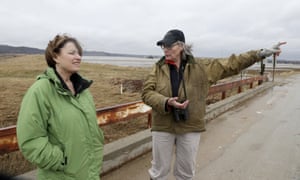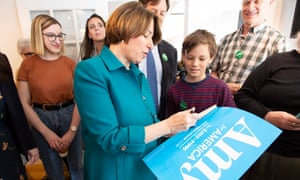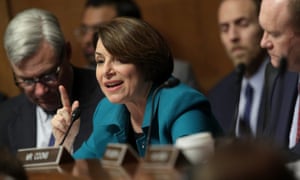‘Iowa slingshot’: Amy Klobuchar plots midwest route to victory in 2020
The Minnesota senator, who has consistently won big in a purple state, may have what it takes to beat Trump – if she can survive the primary
by Tom McCarthy
Amy Klobuchar, the senator from Minnesota, has a simple but powerful pitch in asking fellow Democrats to nominate her to run against Donald Trump for president.
The pitch, in one word: victory.
The gigantic field of Democratic presidential candidates might boast bigger names (Joe Biden), louder voices for change (Bernie Sanders, Elizabeth Warren) and more breakout stars (Pete Buttigieg, Beto O’Rourke).
But Klobuchar has some name recognition where it counts, in the early voting state of Iowa. She has a progressive voting record. She has some star wattage, showcased in a Senate hearing last year when she calmly questioned the supreme court nominee Brett Kavanaugh about his drinking, drawing from him a snide reply for which he later apologized.
And in an election where Democrats have repeatedly told pollsters that what matters most to them is defeating Trump, Klobuchar can make a unique argument for her candidacy.
She can unfold a map of the United States and place a finger on Minnesota, her home state, which crowns the upper midwest, a region where Trump won the White House by scoring two upset wins in 2016. It’s a region with a lot of Republicans and swing voters of the kind both parties will need in 2020.
But even in the reddest, most conservative corners of this purple place, Klobuchar has cleaned up. In three statewide elections over a dozen years, she has beaten Republican opponents by 20, 35 and 24 points, respectively. Farmers, miners, truckers, nurses and teachers – many of them the white, working-class voters who tipped the scale last time – have turned out to support her.
“In a moment when the Democratic party is split between moving further to the left and defeating Donald Trump, Klobuchar steps in and says, ‘Well, I can do both. I’m both progressive and I’m electable,’” said Lawrence Jacobs, director of the Center for the Study of Politics and Governance in the Hubert H Humphrey School at the University of Minnesota. “That’s her message.
“She has done remarkably well in Minnesota in terms of elections,” Jacobs continued. “She’s constantly in a car driving around the state. And there are lots of places where we usually don’t see Democrats, where Amy Klobuchar makes it a point to be showing up and knowing the people on Main Street, who work there.
“She’s your classic retail politician.”
Before Klobuchar gets to clobber Trump on her own turf, however, there is the small matter of the 20 or so fellow Democrats competing for the chance to do the same. And at a time when the heart of the party is beating with a new progressive passion, it’s not clear that Klobuchar will get the nod.
‘Corporate Democrat’
Some Democratic voters, for whom a politician’s ability to appeal to Republicans is as much a cause for suspicion as celebration, question Klobuchar’s leftwing credentials.
“It’s pretty clear that she’s not trying to run by earning the support of progressives,” said Neil Sroka, communications director for Democracy for America, a progressive political action group. “She seems to be trying to find a path to victory along this kind of narrow corporate-Democrat lane.”
The senator has called the Green New Deal, progressive Democrats’ blueprint to address climate change, “aspirational”. She resists calls for “Medicare for All”, the most aggressive Democratic plan for overhauling healthcare. Unlike other candidates, she has not called for free college education, and she does not want to abolish the Immigration and Customs Enforcement agency (Ice), as immigrants’ rights groups have demanded.
But while Klobuchar’s political identity might scan as centrist, her voting record is in line with the Senate’s progressive wing, argued Kory Wood, a Republican strategist with RightVoter who has worked on statewide campaigns in Minnesota.
“If you really dive into her record, she’s definitely no Joe Manchin,” Wood said, referring to the West Virginia Democrat who sometimes votes with Trump. “She votes with her party when it comes to big issues like abortion and immigration.”

And Klobuchar has led the way on emerging issues on the progressive landscape, including a call for online privacy and new regulations on big technology companies, a call she delivered as she cheerily announced her presidential bid during a February Minnesota snowstorm.
“We need to put some digital rules into law when it comes to people’s privacy,” she said. “For too long the big tech companies have been telling you ‘Don’t worry! We’ve got your back!’ while your identities are being stolen and your data is mined. Our laws need to be as sophisticated as the people who are breaking them.”
Klobuchar might be able to win the presidency, but that’s not worth much if she can’t win the nomination first. And to do that, political analysts say, she might need to look homeward again.
Minnesota
Klobuchar, who turns 59 this month, grew up in Plymouth, Minnesota, a suburb of Minneapolis, the state’s largest city and a launching ground for its biggest political stars, including former vice-presidents Hubert Humphrey and Walter Mondale, a Klobuchar mentor.
Her mother was a grade-school teacher descended from Swiss immigrants; her father, who is 91, was a popular newspaper columnist; and her grandfather was an iron ore miner whose family immigrated from Slovenia. (The name Klobuchar means “hatmaker” in Slovene, the senator informs us in her memoir.)
Klobuchar has pointed out that her family background gives her an unlikely tie to the White House. “Melania is Slovenian, just like me!” she joked in a Vogue profile. “I say every time I look at her, it’s like looking in the mirror.”

After growing up hearing stories about her grandfather saving for her father’s college by filling coffee tins with cash, Klobuchar attended Yale University, earned a law degree at the University of Chicago, and joined a corporate firm in Minneapolis.
Then life took a turn. Her daughter, Abigail, was born with a condition that prevented her from swallowing. But Klobuchar was not allowed to stay overnight in the hospital where her infant was in intensive care. Infuriated, she became a citizen lobbyist – and succeeded in winning a law allowing mothers to stay in hospitals for at least 48 hours after childbirth.
Klobuchar ran for county attorney in 1998 and became responsible for overseeing criminal prosecutions in Minneapolis and 35 surrounding suburbs. She pushed to allow videotaping of police interviews of criminal suspects and pioneered hate crimes legislation. After four years, she won re-election unopposed.
Washington
When she ran for US Senate in 2006, the state discovered an indefatigable fundraising juggernaut. As a candidate, Klobuchar called for a “renewable energy revolution” and penalties for oil companies, but she also ran as a centrist, preaching fiscal discipline and sitting on the fence on the question of withdrawing troops from Iraq .
“I don’t think you can say that [invading Iraq] has made us safer,” she said. “But I don’t believe we can pull out tomorrow. We have to have a plan to bring the troops home safely and it must be done responsibly.”
Klobuchar was the first woman elected to the US Senate from Minnesota. She soon showed her industriousness as a consumer protections advocate, and later she shepherded into law measures to combat sexual assault, prevent human trafficking, prevent elder abuse and to fight the opioid epidemic. In 2016 she was ranked first in the Senate for getting bills signed into law. In 2018, Republicans tried but failed to recruit a big-name candidate to challenge her re-election.
Though popular with colleagues, she also became known for high staff turnover, and after she announced her presidential bid, multiple reports were published carrying anonymous complaints of mistreatment from former staffers.

“Yes I can be a tough boss and push people,” she told Fox News in response. “That’s obvious. But that’s because I have high expectations of myself, I have high expectations of those that work with me, and I have high expectations for the country.”
Klobuchar, who has written about her father’s struggle with alcoholism, inadvertently found a new spotlight last September in questioning Kavanaugh, who had admitted to sometimes drinking too much.
She asked if he had ever drank so much he couldn’t remember what happened.
“You’re asking about blackout,” Kavanaugh shot back. “I don’t know – have you?”
“Could you answer the question, judge?” she replied, almost sympathetically. “That’s not happened – is that your answer?”
“Yeah,” Kavanaugh said, “and I’m curious if you have.”
“I have no drinking problem, judge,” Klobuchar said.
“Nor do I,” Kavanaugh retorted.
It became a signal moment from the hearing, focusing the national spotlight not only on Kavanaugh’s petulance but also on a senator about to become a presidential candidate. But to Klobuchar, it was just “kind of sad”.
‘Iowa slingshot’
Each candidate for president talks about a path through the primary states, which vote over a series of months in a party-approved order. Nearly every path includes a good showing in Iowa, the first state to vote in the primary season.
Klobuchar, who has a relatively slight national profile, is in particular need of an Iowa boost. But she might be able to capitalize on a sort of home-court advantage there, in part because the state borders Minnesota and many voters especially in northern Iowa already know of her, said Jacobs.
“If she can kind of shock the political world in Iowa, and end up in one of the top one or two or three positions, she’s going to get that opportunity to make her case that she offers both electability and progressive values,” said Jacobs.
“She’s looking for an Iowa slingshot.”
Source: Elections - theguardian.com




